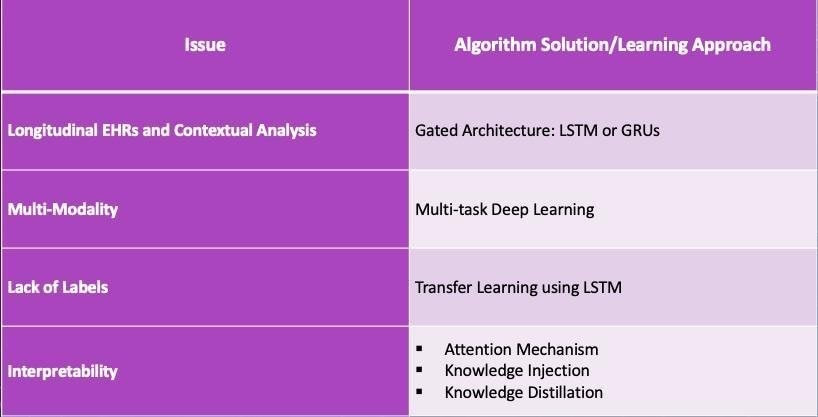|
Earlier this year American researchers Xiao, Choi and Sun published a systematic review about the application of deep learning methods to extract and analyse EHR data in the prestigious JAMIA journal. The 4 categories of analytic tasks that they found deep learning was being used were 1) Disease Detection/Classification 2) Sequential prediction of clinical events 3) Concept embedding where feature representations are derived algorithmically from EHR 4) Data augmentation whereby realistic data elements or patient records are created and 5) EHR data privacy where deep learning was used to protect patient privacy. More importantly, they identified challenges in the application and corresponding solutions. I have summarised the issues and solutions in this table:
1 Comment
Why a third AI winter is unlikely to occur and what it means for health service delivery?23/10/2018 Around the late 1970's, the so called first 'AI winter' emerged because of technical limitations ( the failure of machine translation and connectionism to achieve their objectives). Then after in the late 1980's, the second AI winter occurred because of financial/economic reasons (DARPA cutbacks, restriction on new spending in academic environments and collapse of the LISP machine market). With the current re-emergence of AI and the increasing attention being paid to it by governments and corporates, some are speculating another AI winter may occur. Here is a lay commentary as to why this may occur: https://www.ft.com/content/47111fce-d0a4-11e8-9a3c-5d5eac8f1ab4 and here is a more technical commentary: https://blog.piekniewski.info/2018/05/28/ai-winter-is-well-on-its-way/
What these commentator's don't take into account is the conditions that prevailed in the late 70's and 80's are not the conditions prevalent now. The current demand for AI has emerged because of actual needs (the need to compute massive amounts of data). With the rapid rise in computational power, increase in acquisition of data from all quarters of life, increased investment by governments and corporates, dedicated research units both in academia and corporate bodies, integration with other innovative IT areas like IoT, Robotics, AR, VR, Brain-Machine Interfaces..etc there has never been a better time for AI to flourish. What sceptics seem to mistakenly assume is that developers are intending for Artificial General Intelligence to occur. Maybe there is a time when this is to occur but nearly all developers are focused on developing narrow AI applications . The rediscovery of the usefulness of early machine learning algorithms and introduction of newer forms of machine learning algorithms like convolutional neural networks, GANs, Deep Q networks..etc coupled with advances in understanding of symbolism, neurobiology, causation and correlational theories have advanced the progress of AI applications. If commentators stop expecting that AI systems will replace all human activities and understand that AI is best suited to augment/enhance/support human activity, there would be less pessimism about the prospects of AI. Of course, there will be failures as AI gets applied in various industries followed by the inevitable 'I told you so' by arm-chair commentators or sardonic academics but this will not stop the progress of AI and related systems. On the other hand, if AI researchers and developers can aim for realistic objectives and invite scrutiny of their completed applications, the waffle from the cynics can be put to rest. So where does this leave health services and the application of AI in healthcare? Traditionally the clinical workforce have been slow adopters of technological innovations. This is expected as errors and risks in clinical care unlike other industries are less tolerated and many times unacceptable. However, the greatest promise for AI is in its application in healthcare. For long, health systems across the world have been teetering on financial bankruptcy with governments or other entities bailing them out (I can't think of a health system, which runs on substantial profits) . A main component of the costs of running health services is recurrent costs, which includes recurrent administrative and workforce costs. Governments or policy wonks have never been able to come up with a solution to address this except reiterate the tired mantra of early prevention or advocate for deficit plugging or suggest new models of workforce, which are hard to implement. Coupled with this scenario, is the humongous growth in medical information that no ordinary clinician can retain and pass onto their patients or include in their treatment, rapid introduction of newer forms of drugs and treatments and the unfortunate increase in the number of medical errors (In the US, approximately 251,454 deaths are caused per annum due to medical errors). AI Technology, provides an appropriate solution to address these issues considering the potential of AI enabled clinical decision support systems, digital scribes, medical chatbots, electronic health records, medical image analysers, surgical robots, surveillance systems; all of which can be developed and delivered at economical pricing. Of course, a fully automated health service is many years away and AI regulatory and assessment frameworks are yet to be properly instituted. So we won't be realising the full potential of AI in healthcare in the immediate future. However, if health services and clinicians think AI is another fad like Betamax, Palm Pilots, Urine therapy, Bloodletting and lobotomies they are very mistaken. The number of successful instances of the application of AI in healthcare delivery is increasing at a rapid rate for it to be a flash in the pan. Also, many governments including the Chinese, UAE, UK and French governments have prioritised the application of AI in healthcare delivery and continue to invest in its growth. While AI technology will never replace human clinicians it will most certainly replace clinicians and health service providers who do not learn about it or engage with it. Therefore it is imperative for health service providers, medical professional bodies, medical schools and health departments to actively incorporate AI/technology (machine learning, robotics and expert systems) in their policies and strategies. If not, it will be a scenario of too little and too late depriving patients of the immense benefits of personalised and cost-efficient care that AI enabled health systems can deliver. |
AuthorHealth System Academic Archives
December 2023
Categories |


 RSS Feed
RSS Feed